
- Afhalen na 1 uur in een winkel met voorraad
- Gratis thuislevering in België vanaf € 30
- Ruim aanbod met 7 miljoen producten
- Afhalen na 1 uur in een winkel met voorraad
- Gratis thuislevering in België vanaf € 30
- Ruim aanbod met 7 miljoen producten
€ 44,45
+ 88 punten
Uitvoering
Omschrijving
Gertrudis Gomez de Avellaneda (1814-1873) was born in Cuba and split her life between Spain and her native island. Author of original novels, short stories and drama, she wrote «Sab» (1836-1841), considered the first Cuban novel about slavery in the island. Within its plots and subplots «Sab» comprises a modern message, as Gertrudis Gomez de Avellaneda, a highly prized author during her active literary life, exposes and advocates for the principles of freedom and equal human as well as feminine rights by means of a highly romantic story, building up a message that still stands valid today, as in the contemporary world human rights are subject of violent violations every day. The novel's first edition (1841), published in Spain, suffered the island's colonial government censorship. Upon arrival to La Habana the copies were seized at the Cuba Royal Customs, the official Censor claiming that they «express doctrines subversive to the island's slavery system». However, the vast majority of the modern criticism has resisted classifying this Avellaneda writing as «anti-slavery». Aiming to rectify this conception, prof. Ivan A.Schulman's foreword to this new edition highlights the anti-slavery elements imbedded in the text, all the while accepting that the author's voice provenience is the «center», or «metropolis», thus her speech shows many aspects that can be seen to agree with the Cuban «sugar aristocracy» slavery supporting stance. The results of this duality is a two faced novel, a story full with cogitations and contradictions about race, color, «whitening», slavery and feminism, intertwined in a transgressor speech deeply rooted in the XIX Century Cuba.
Specificaties
Betrokkenen
- Auteur(s):
- Uitgeverij:
Inhoud
- Aantal bladzijden:
- 186
- Taal:
- Spaans
Eigenschappen
- Productcode (EAN):
- 9781934768389
- Verschijningsdatum:
- 10/01/2011
- Uitvoering:
- Paperback
- Formaat:
- Trade paperback (VS)
- Afmetingen:
- 152 mm x 229 mm
- Gewicht:
- 281 g

Alleen bij Standaard Boekhandel
+ 88 punten op je klantenkaart van Standaard Boekhandel
Beoordelingen
We publiceren alleen reviews die voldoen aan de voorwaarden voor reviews. Bekijk onze voorwaarden voor reviews.










